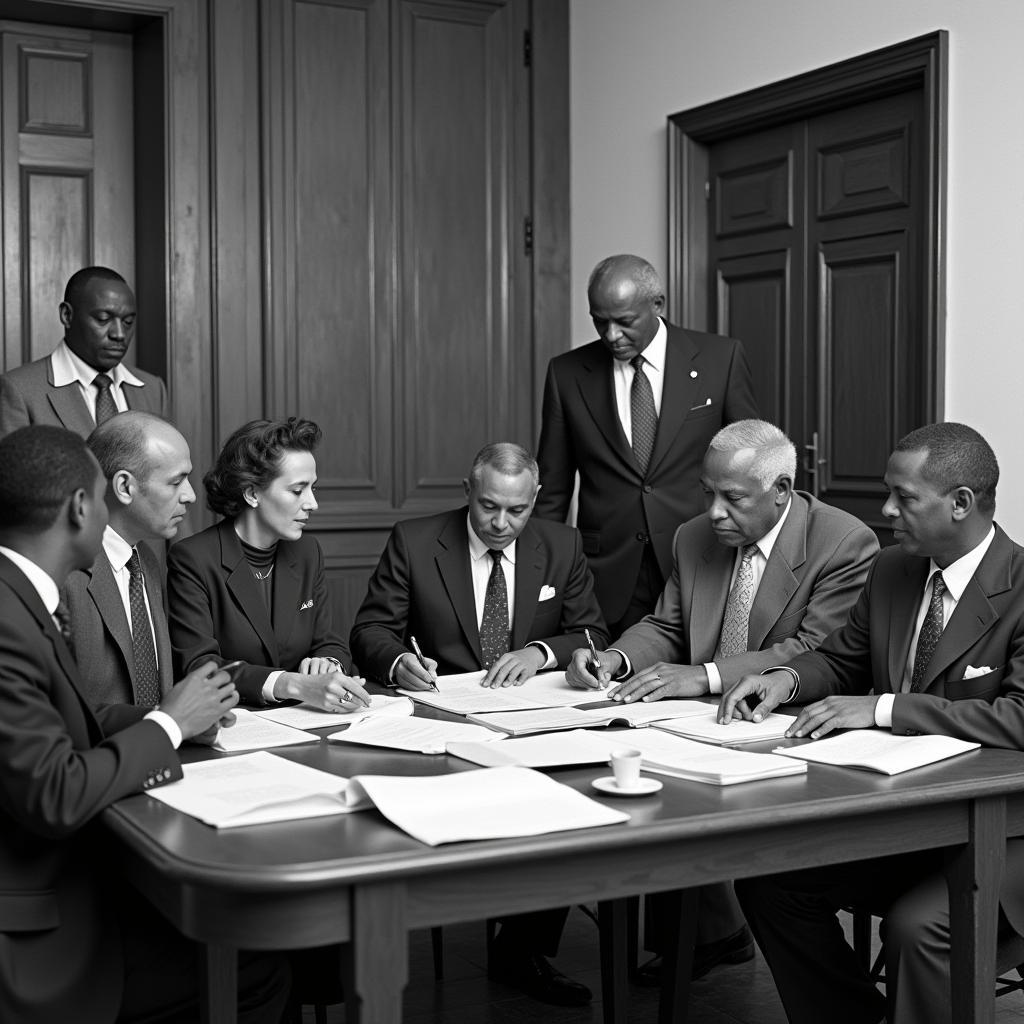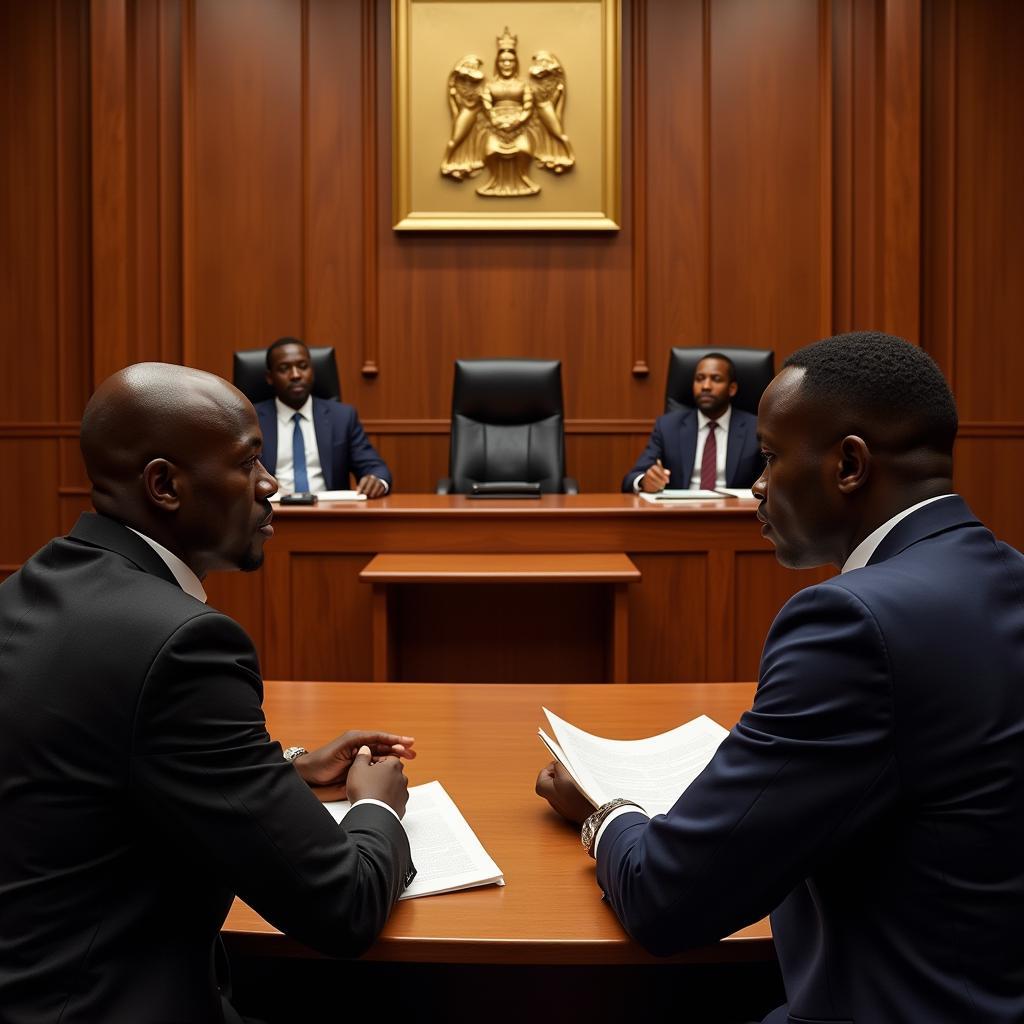The Complex Landscape of the African Constitution
The term “African Constitution” encompasses a diverse and dynamic array of legal documents that govern the 54 independent nations across the African continent. These constitutions, shaped by unique historical contexts, cultural values, and political realities, reflect the complexities and contradictions inherent in African societies.
Navigating Colonial Legacies and the Birth of African Constitutions
Many African constitutions were drafted in the aftermath of independence movements, marking a symbolic break from colonial rule. However, the process of constitution-making was often fraught with challenges.  Drafting of Early African Constitutions
Drafting of Early African Constitutions
The existing legal frameworks, largely inherited from colonial powers, often clashed with traditional African systems of governance and customary laws. Reconciling these different legal traditions proved to be a significant hurdle for many newly independent states.
The Quest for Democracy and the Rule of Law
A common thread running through many African constitutions is the aspiration for democracy and the rule of law. These documents enshrine fundamental rights and freedoms, establish systems of checks and balances, and outline the principles of democratic governance.
 Justice and the African Legal System
Justice and the African Legal System
However, the reality on the ground has often fallen short of these lofty ideals.
Challenges to Constitutionalism in Africa
African countries have grappled with various challenges to constitutionalism, including:
- Political Instability and Coups: Military interventions and unconstitutional changes in government have undermined the rule of law and eroded public trust in constitutional processes.
- Corruption and Lack of Accountability: Widespread corruption and a lack of transparency have hampered the effective implementation of constitutional provisions.
- Ethnic Tensions and Conflicts: Deep-seated ethnic divisions have, in some cases, fueled conflict and hindered national unity, posing challenges to constitutional order.
- Poverty and Inequality: Persistent poverty and socioeconomic disparities have created barriers to accessing justice and enjoying the full benefits of constitutional rights.
The Evolving Nature of African Constitutionalism
Despite these challenges, African constitutionalism continues to evolve. There is a growing trend towards greater citizen participation in constitutional reform processes. Civil society organizations are playing an increasingly vocal role in advocating for constitutional rights and holding governments accountable.  Citizens Advocating for Constitutional Rights
Citizens Advocating for Constitutional Rights
Judicial activism is also on the rise in some countries, with courts asserting their independence and playing a more proactive role in upholding constitutional principles.
Diversity and Regional Variations
It’s crucial to recognize the diversity of constitutional arrangements across the African continent. While some countries have adopted presidential systems, others have opted for parliamentary or hybrid models.
The role of Islam in shaping constitutional frameworks varies significantly across the continent. You can learn more about the interplay between faith and governance in our article on African constitutionalism and the role of Islam.
Similarly, the protection of minority rights and the recognition of customary law are addressed differently in each national context. The preamble to the South African constitution, for instance, is globally recognized for its commitment to social justice and reconciliation. To delve deeper into specific rights, you can explore the South African constitution bill of rights.
The Future of African Constitutions
The future of African constitutions hinges on the ability of African nations to address the root causes of instability, promote good governance, and foster inclusive economic development.
Strengthening democratic institutions, upholding the rule of law, and empowering citizens to claim their constitutional rights will be essential for ensuring that African constitutions serve as living documents that reflect the aspirations and values of the people they are meant to govern. For a deeper understanding of traditional leadership structures, you might find our article on the African Prince insightful.
FAQs on African Constitutions
1. Are all African constitutions based on Western models?
While many African constitutions draw inspiration from Western legal traditions, they also incorporate elements of traditional African systems of governance and customary law.
2. What is the African Union’s role in promoting constitutionalism?
The African Union (AU) has established mechanisms for promoting democracy, good governance, and the rule of law among its member states. It has also played a role in mediating constitutional crises and supporting constitutional reform processes.
3. How can I access an African constitution PDF?
Many online resources provide access to the constitutions of African countries.
4. What are some key challenges to implementing constitutional rights in Africa?
Resource constraints, lack of political will, and societal resistance to change are some of the factors that can hinder the effective implementation of constitutional provisions.
5. What is the role of the judiciary in upholding constitutionalism in Africa?
Independent and effective judiciaries are crucial for interpreting and enforcing constitutional provisions, protecting individual rights, and holding governments accountable.
Need More Information?
For further insights and resources, we encourage you to explore other articles on our website. Have questions or need assistance? Please reach out to us. Our contact details are as follows:
- Phone Number: +255768904061
- Email: kaka.mag@gmail.com
- Address: Mbarali DC Mawindi, Kangaga, Tanzania
Our dedicated customer support team is available 24/7 to assist you.
